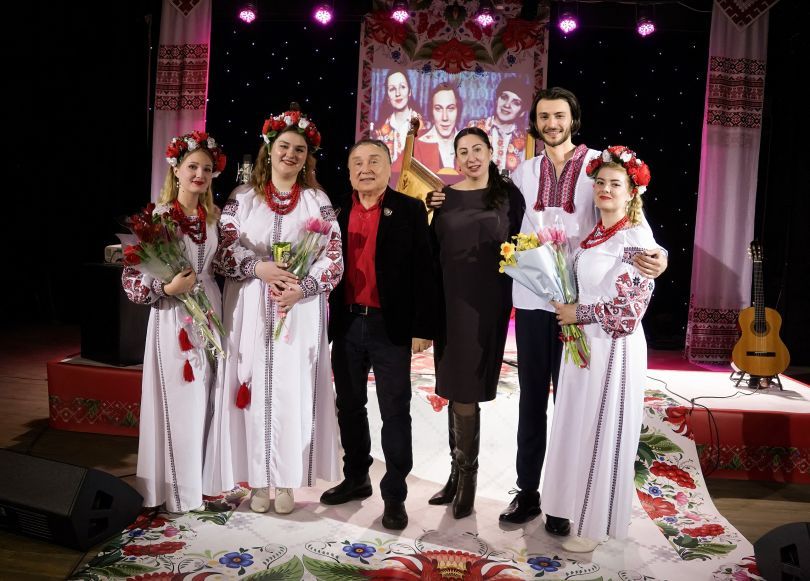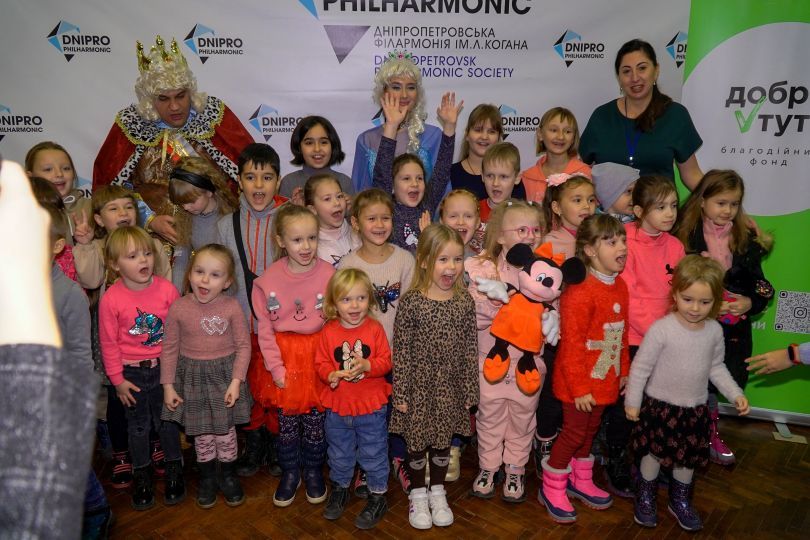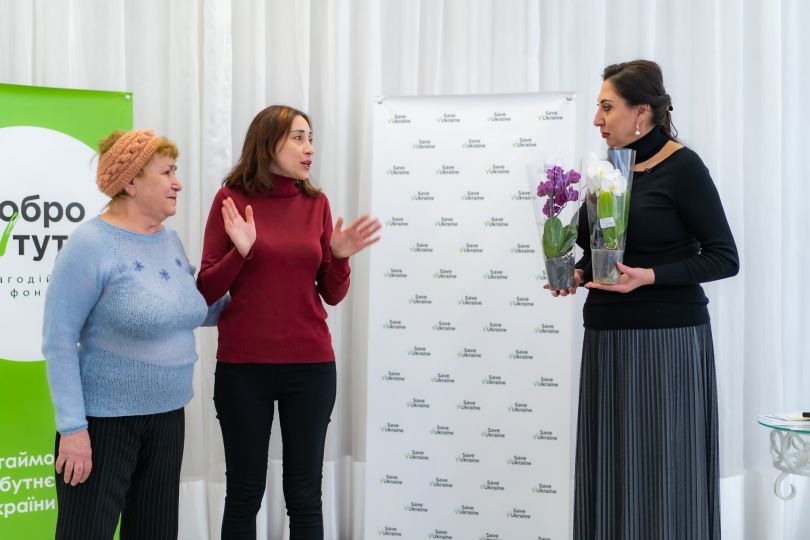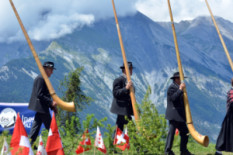We want to tell the stories of those women who have chosen to stay in Ukraine despite the threats and dangers. They strive to build their lives here and now, support each other and their families, and aspire to do something for their country, preserving themselves, their families, and their memories.
Our project, "Those Who Stayed," in collaboration with the Ukrainian women's media platform "Yedyna" (The Only One).
We now present the first interview from this series. Our heroine is Lyudmyla Pasha, a woman from Mariupol who held a high-ranking government position in her city. After that occupation, she volunteered at the charitable foundation "DobroTUT" in Dnipro. It is Lyudmyla's story and her desire to share the stories of other women united by the foundation that inspired the initiation of our project.
Prologue
This beautiful woman, a Ukrainian of Greek origin with an inexhaustible energy of kindness, is helping people who were forced to leave their homeland due to war. Once, in a past life, she lived in the beautiful seaside city of Mariupol.
So many stories have been told about Mariupol. "My life is neither better nor worse," says Lyudmyla at the beginning of our conversation. "I'd rather tell you about our projects in the foundation and our people."
However, can one talk about a new life, its meaning, and activities without learning about the path that had to be traversed before? Probably not.
So the conversation slowly turned to Lyudmyla Pasha's "not particularly special" but very personal "Mariupol story": about leaving the shattered city, a yellow scarf, acquiring a dislike for snow, and losing the sea view from her window.
And much more.
It truly is worth experiencing alongside her.
What was your life like in Mariupol?
I worked in the tax service for 30 years, including leadership positions. My life in Mariupol was filled with many tasks, events, and activities... I had a home with a sea view, many friends, and many joyful moments. But all that, just like Mariupol itself, is now in the past. I know that I can no longer live in my hometown or continue working in the tax service.

Do you plan to return after the victory?
When Mariupol is liberated, I will come back to lay flowers and mourn the loss and the losses. I want a small shrine with the names of those who perished next to every restored house. This city cannot become a "new Singapore" or anything. And I certainly don't see myself there.
I won't return to the tax office either. I have changed a lot. And what the tax office is doing now only brings me shame. So I turned this page of my life.
I am happy that I now work with emotions instead of dealing with numbers. Our foundation gives people exactly that - beautiful, joyful, and fulfilling emotions.
How long did you stay in Mariupol since the start of the full-scale war?
Until March 16, 2022. By then, we had been without electricity, heating, and communication for 17 days, so we didn't know what was happening in the country and the city. Although information about the first "corridor" being organized on March 15 (in reality, there was no proper corridor, people self-organized) reached us.
I was afraid and hesitant because no one knew where the "corridor" would lead us, what awaited us there... And the night before our departure, I had a dream about a dog. It was licking my legs and nudging me towards the door. I truly believe in signs. And a dog is a friend. I understood that I would meet a person on my way who would help me.
I was already at the meeting point by 5 in the morning. Hundreds of cars from Mariupol residents had gathered there. I didn't have a car, so I walked.
I remember it was a very cold March, and it was snowing. Since then, I don't like snow. It was terrifying.
Certain details stuck in my memory: I was wearing a huge knitted yellow scarf. Only later did I realize what it looked like: I was walking through all those checkpoints wearing a bright yellow scarf. At the same time, I knew clearly that they wouldn't let me through if they found out I was a government official, and I was afraid that someone, a traitor, might "betray" me to the enemy.
Cars were driving and driving - damaged, often without windows, with signs saying "children" and white ribbons on the mirrors. Many of them had pets inside. Our foundation even organized campaigns for these "displaced animals." They are precious to many of us, just like close family members.

Some cars would stop to say they would like to take me, but there was no space. They assured me that someone would pick me up.
I kept walking and walking. Then suddenly, I saw a car with familiar license plates coming straight towards me, and it stopped. My godfather got out of the car... That's when I lost consciousness for the first time in 48 years. I regained consciousness when he shook my hands, repeating, "I will take you, I will take you." He was the same friend who was supposed to help me.
And we drove off. At that time, I didn't know yet that I was going to a different country, to a different life.
When did you realize you were going to a different part of Ukraine?
In Tokmak, our "corridor" passed through, and we saw people lining the road. There were so many people. They were holding bags from a nearby supermarket and giving us food.
Some ran with empty bags to the store, and others took their place. Can you imagine? Many of us hadn't seen bread for a long time... everyone was filled with fear, and uncertainty. We had no idea what was happening in the whole country... And then there were these people!
It was at that moment that I realized Ukraine had changed. Such unity, such boundless willingness to help. They couldn't stop the shells from flying toward us in Mariupol, but they did what they could.
That town's mayor ordered to distribute 10 liters of gasoline for free to Mariupol residents. It was necessary, but that amount wouldn't last long for us. So, locals who had come from that town would tell us that the fuel was for them and ask to fill our tanks. The gas station didn't object.
It was precisely in that town that I reevaluated my perception of Ukraine.

How did you end up in Dnipro?
As soon as communication was restored, I started calling friends and acquaintances. From Yehor Sadovenko, who organized the charity foundation where I currently work, I heard: "Go to Dnipro. That's where Ukraine is."
We stopped in Zaporizhzhia on the way because we needed a place to stay overnight. My friends, ten people in two cars, welcomed us. When we arrived, there were 10 liters of borscht, vodka, herring, and meat pies. Hot water and white bed sheets. No one slept that night, of course. But those white bed sheets... It was the first time in a long time that we had the opportunity to sleep in a bed because our dreams were short and filled with anxiety in Mariupol.
At that moment, I thought that God had saved me for something. Perhaps for something good.

How did you spend the first days and months in free Ukraine?
In the first month, I tried to satisfy my hunger for information. I constantly watched the news, hoping "soon we'll return to Mariupol."
When our troops left Azovstal, the city stopped being heavily bombed. Then, we slowly began to find out what was happening there. It turned out that a week after we left, a bomb hit the building where my apartment was located. The neighboring apartments were burned, but mine survived, although it was severely damaged. Furthermore, people from the Ministry of State Security (MGB) of the so-called DPR (Donetsk People's Republic) came to my home to arrest me as a civil servant who worked for Ukraine. They took photographs with the national flag and receipts for the apartment.
When I learned all this, it was tough. But at some point, I decided it was time to turn the page. There was no going back.
For a while, I felt strange. I understood that I had nothing and needed to buy many things, but in my mind, I thought, "I have everything. Why should I buy it?" My brain took a while to adjust. But eventually, I told myself that enough was enough. I had to move on.
I started working at a foundation. At first, it was small-scale: we organized the first small campaigns. Then it grew more and more. Nowadays, we work almost non-stop, even on weekends.

How has this work and experience changed you?
There are no more high heels in my life because I simply gave them up (laughs). Now it's just regular sneakers. Jeans. But it's still difficult, and I think it will be for a long time. However, there has been a reassessment of values. That's how I cope. Honestly, I'm unsure if the foundation needs me, but I need the foundation.
By the way, from the office window, you can see the river. I could see the sea at home, and here it's the Dnipro. It's my little joy.
But something hasn't changed (smiles): I'm constantly busy, always learning something new. From all my skills and knowledge from my past life, communication and education remain. I interact a lot with children. They are also my saviors.
You seem so fulfilled and energetic. There's an impression that you let go and feel lighter...
Yes, it has become easier - now I cry three times a week instead of every day (laughs).

What does the foundation do, briefly?
Our foundation is called "Good HERE," which says it all. Because we teach people to believe in goodness and miracles. As I mentioned before, we give emotions. It is essential that, in addition to food packages or other material assistance, people can feel care, closeness, and joy. They can have entertainment and, at the same time, form new social connections. And for this purpose, we organize numerous warm events: we go to theaters and cinemas, we have created an art therapy center for mothers called "Calm Mother - Calm Family," and a "Media Academy" for children. We also hold gift contests. There is a lot of warmth and hugs, although it doesn't go without tears. But increasingly, these are tears of joy.
And you know what? I can immediately recognize our people. Let's say our people and Dnipro residents are walking. I look into the eyes of these people and immediately say, "You are with us." I have a connection with them. It's like an umbilical cord.

What is most important to you in all of this?
Seeing people start to believe in goodness, seeing all of this happening to them, and seeing the changes in their eyes. These changes are what I and all of us here work for.

Towards victory?
Towards victory and beyond. Because the consequences of war will not leave us all for a long time, we will nurture faith in goodness and continue. Because that is the primary purpose, that's why I live.








